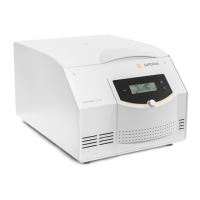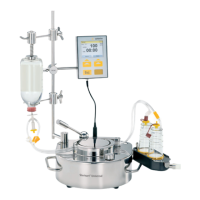Version 09/2015, Rev. 1.3 of 02/03/2017
Translation of the original operating manual, WZG6001-e150401
Pos: 207 /100 Sigma/1 00 BA Zentr ifugen Sigma (Sta ndardmodule)/1 10 Anhang/110 -0030 Beschleu nigungs- und Bremskurv en Spincontrol L @ 28 \mod_14053 20707842_68.do cx @ 195167 @ 2 @ 1
11.3 Acceleration and deceleration curves
Linear curves are numbered in the direction of increasing acceleration (from right
to left).
The deceleration curves are inverted images of the acceleration curves and are
assigned the same numbers. An exception is curve 0. It decelerates brakeless (spin-
out).
In general, the runtime, until the set speed is reached, depends on the moment of
inertia of the rotor.
Linear curves
The slope of the fixed acceleration curves defines the time that is required to
accelerate the rotor by 1,000 rpm.
Curve 9 is a special case compared to the other curves. The centrifuge accelerates
with maximum power. The runtime, until the set speed is reached, depends solely
on the moment of inertia of the rotor.
Fig. 29: Slope of linear curves

